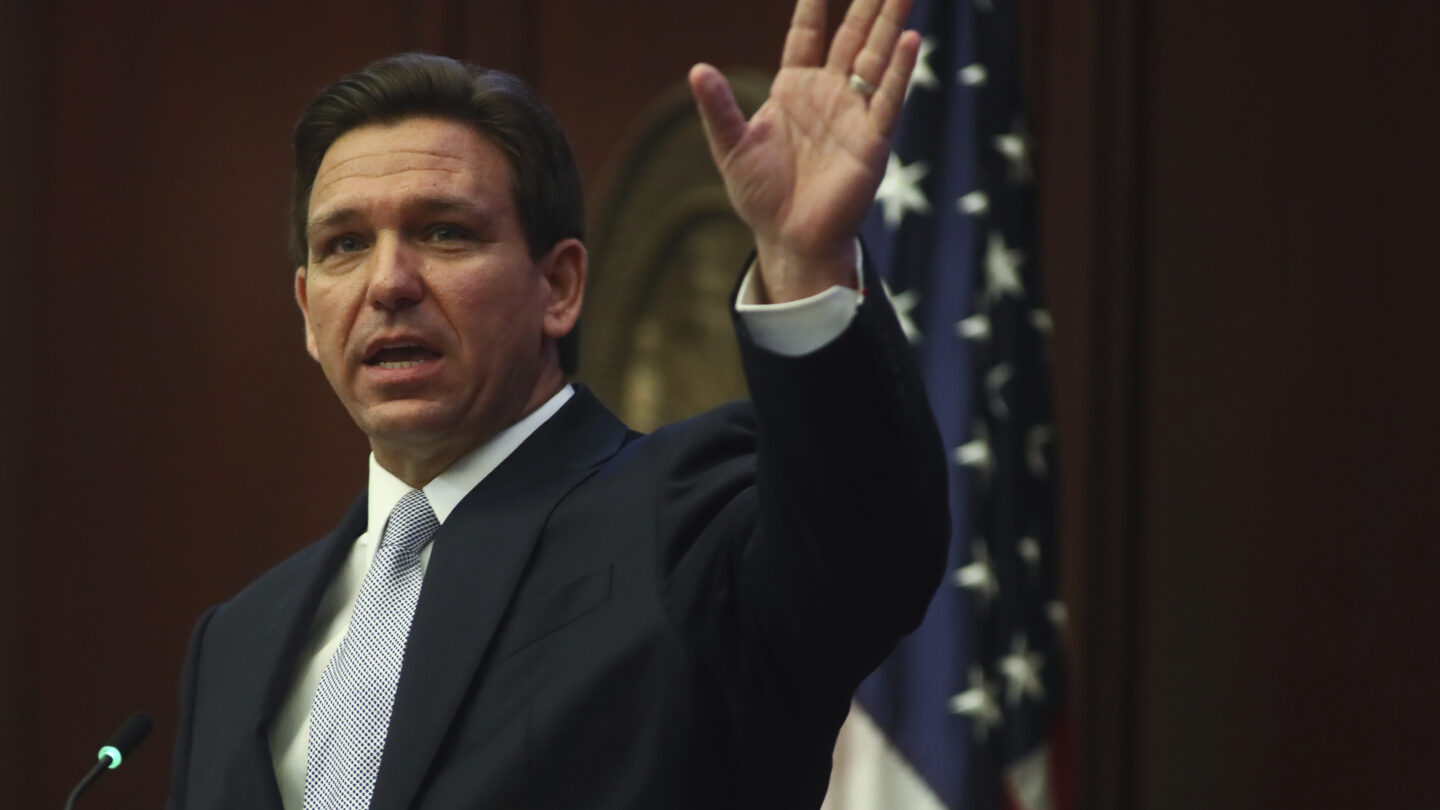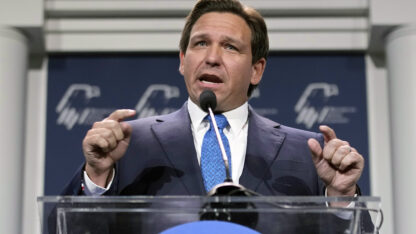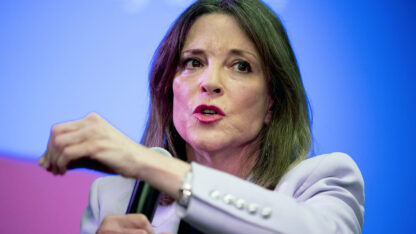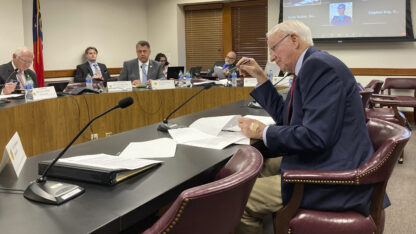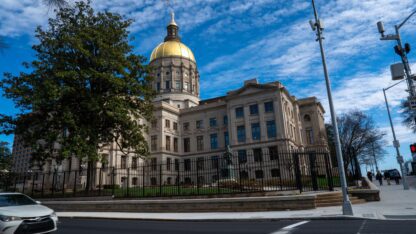Florida Gov. Ron DeSantis positioned himself as the architect of a new conservative vision for the nation during a State of the State address on Tuesday that championed his aggressive stances through the pandemic and culture wars as a blueprint for Republican leadership.
The address came at the outset of a 60-day legislative session that has added political significance because it is expected to serve as a platform for DeSantis’ highly expected presidential campaign.
“We defied the experts. We bucked the elites. We ignored the chatter. We did it our way, the Florida way,” DeSantis told lawmakers in Tallahassee. “And the result is that we are the number one destination for our fellow Americans who are looking for a better life.”
The Legislature’s Republican supermajority is eager to promote DeSantis’ political prospects and is expected to rubber stamp virtually all of his agenda, which is packed with issues ranging from race to immigration to gender that could prove popular in a GOP presidential primary.
Instead of focusing on rising rents and cost of living, a property insurance market that’s in distress and preparing for rising sea levels in a state vulnerable to climate change, DeSantis kicked off a session where the GOP will push issues like telling teachers which pronouns they can use for students, making guns more available to Floridians, keeping immigrants that are in the country illegally out of the state, and criminalizing some drag shows as Tennessee recently did.
In his speech, DeSantis ran through the conservative accomplishments of his tenure thus far and highlighted upcoming measures that will be popular with some Republican primary voters, such as a proposal to eliminate concealed firearms permits.
In a signal of the Republican policy schedule to come, a GOP lawmaker on Tuesday introduced a bill to ban abortions after six weeks, with Democrats denouncing the move not long after DeSantis finished his speech. DeSantis previously indicated that he would sign such legislation.
Though the governor is unlikely to formally announce a presidential campaign before the Legislature wraps up its work in May, he’s already making big moves toward a White House bid. He participated in a high-profile donor retreat last week in Florida before traveling to California, where he delivered a broadside against what he argued were excesses of liberalism. Later this week, he’ll travel for the first time this year to Iowa, which will host the nation’s first Republican presidential caucus in 2024.
Even without an official campaign in place, DeSantis is emerging as a leading alternative to former President Donald Trump, a fellow Floridian who has already announced his third White House bid. DeSantis’ strength is fueled in part by commanding a nearly 20 percentage point reelection victory last year in a state that’s often infamous for close elections.
He’s done so by limiting how issues such as race and sexuality can be taught in schools, banning transgender girls and women from school sports, rewriting the state’s political maps to favor Republicans and dismantle a congressional district that favored Black voters, attacking private businesses that disagree with his ideology and cracking down on Black Lives Matter protests.
“Our governor is truly America’s governor. He has defended our conservative values, challenged the individuals and institutions who pose threats to others, and posed innovative solutions to better our state,” Republican state Senate President Kathleen Passidomo said Tuesday. “It is often said that states are laboratories for democracy. Under the leadership of Gov. DeSantis, Florida is more than a laboratory. We are a model.”
DeSantis acknowledges that his decisions as governor are based on what he thinks is right and not necessarily what’s popular in the mainstream. He said that’s why he was able to turn a 32,000-vote, recount-confirmed victory in 2018 into a 1.5 million-vote victory last year — the largest margin a Republican governor has ever won in the state.
“November’s election results represent a vindication of our joint efforts over these past four years. The results also vest in us the responsibility to lead and provide us the opportunity to shoot for the stars,” DeSantis said Tuesday. “Boldness be our friend in this endeavor… we have a lot we need to accomplish.”
The governor has been the frequent target of jokes on late-night shows such as “Saturday Night Live” and “The Late Show with Stephen Colbert,” but the more critics mock DeSantis, especially those he calls the “liberal elite,” the more he galvanizes support among his base.
While most candidates who jump into a presidential race two years out spend early campaigning days raising money, traveling the country building support and boosting their name recognition, DeSantis still has $70 million in a political committee just four months after his reelection.
And he’s already a star de jour at GOP events nationally.
“You don’t see the flag of Florida standing behind him anymore. They’re all American flags,” said Democratic state Sen. Jason Pizzo.
DeSantis released a book last week titled, “The Courage to be Free,” and its subtitle foreshadows his 2024 plans: “Florida’s Blueprint for America’s Revival.” Instead of the Trump slogan of “Make America Great Again,” DeSantis is building the case to make the nation look more like Florida and less like states such as California and New York.
“We have the opportunity, and indeed the responsibility, to swing for the fences so that we can ensure Florida remains number one,” DeSantis said in his speech. “Don’t worry about the chattering class, ignore all the background noise, keep the compass set to true north. We will stand strong, we will hold the line, we won’t back down, and I can promise you this: You ain’t seen nothing yet.”
But Democrats see it as intolerance and misdirected priorities. They point to efforts to build off a new law that critics call “Don’t Say Gay” that limits discussion of gender and sexuality in schools. A new GOP proposal would limit how schools can use gender pronouns, while another would criminalize some drag shows.
Democrats are not only resigned to the fact that the GOP supermajority will prevent them from voting down legislation they oppose, but they’re also concerned their Republican counterparts have abdicated responsibility to DeSantis.
Democratic House Leader Fentrice Driskell said that while Republicans have controlled the governor’s office and Legislature for 24 years, in that time, she’s never seen a governor wield so much power over lawmakers.
“All of this being driven by his ambition. I think there are those in leadership who want to be close to this governor because they view him as rising in power,” she said. “But the people who pay the cost and the brunt of all of this is everyday Floridians. Every one of the governor’s culture wars has an economic cost built into it. Every single one of them.”
